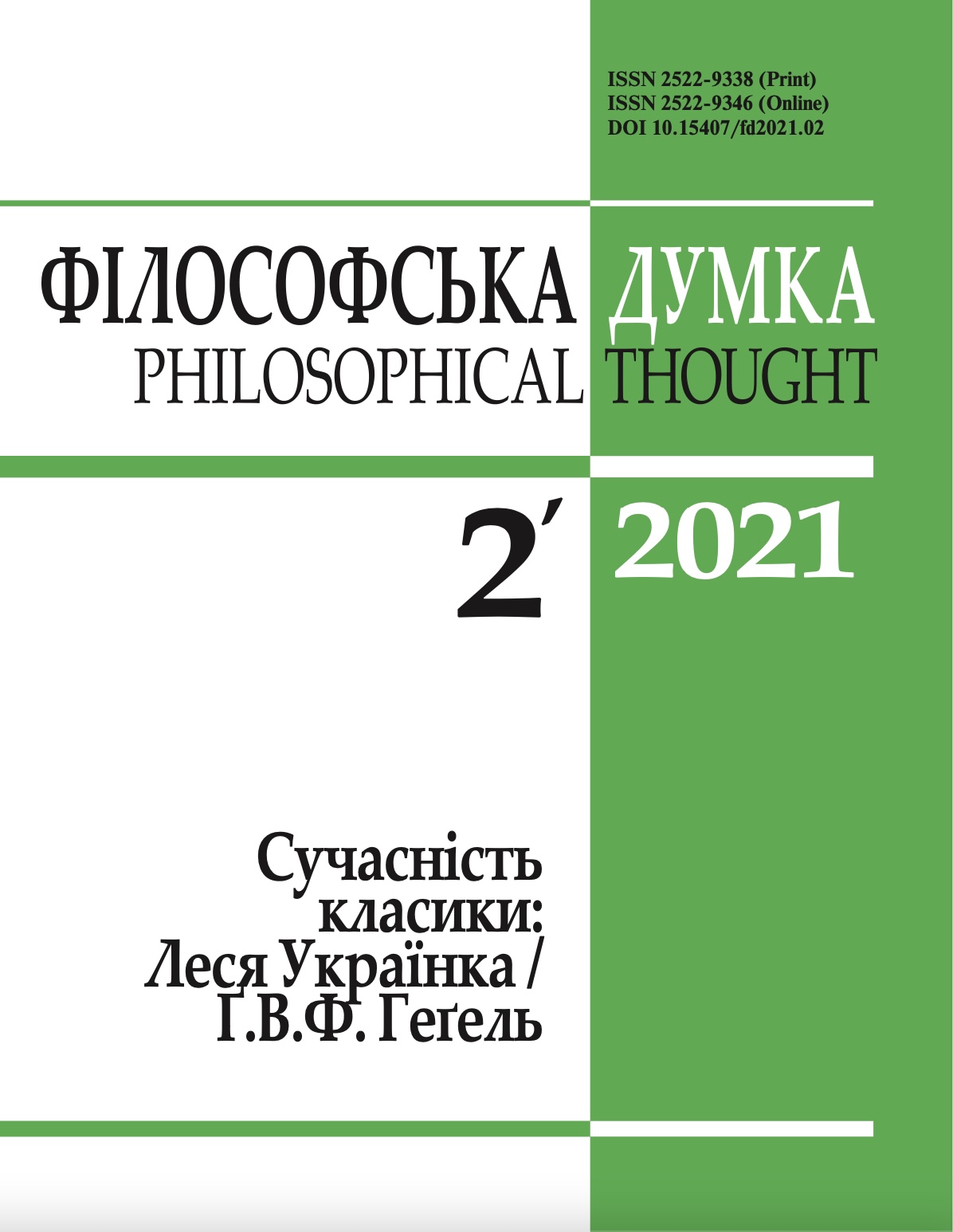HEGEL, HÖLDERLIN AND WE, THE UKRAINIANS, OR: IS IT WORSE TO ACCEPT RECOMMENDATIONS OF THE GERMAN IDEALISM?
DOI:
https://doi.org/10.15407/fd2021.02.099Keywords:
German idealism, Hegel, Hölderlin, philosophy, education, freedom, renewal, concept, reason, Ukrainian societyAbstract
The article represents the explication of some Hegel’s ideas with coherence to Hölderlin’s phi- losophical reflections, all of which are dealing with the problem of making more significant the philosophy for the social life especially in the period of the national self-statement and radical cultural transformations on the crossing of the XVIII-th and XIX-th centuries. The communi- cation between Hegel and Hölderlin shows the different ways of making philosophy more avail- able for lower classes of population. Hölderlin’s considering on this problem was to make philo- sophical thinking more sensuous through its transforming into a new rational religion. Hegel perceived solving of this problem in education and teaching without reducing standards of phi- losophy as a science. The university philosophy with its abstract concepts and systems was crit- icized by Hölderlin and accepted by Hegel, because his aim was to activate the social and ori- entation functions of philosophical ideas. The popular philosophy with its metaphorical lan- guage was regarded by him as preparing for fundamental philosophical studies. The role of the philosophical lyric in the evolution of German Idealism is analyzed with its impulses for the renewal of philosophical thinking. Hegel shows some risks of symbiosis of the lyric and philo- sophy such as losing its freedom and turning into a new mythology with eclipse of reason. Hegel emphasizes the role of the grammar of philosophical thinking: its concepts and categories. The dia- lectical potential of concepts is illustrated on their cunning possibility what might be regarded as opening of closed systems. The adaptation possibilities of this theoretical and practical experience to the Ukrainian social and cultural contexts are regarded. Hegel’s interpretation of the dialec- tical interconnection existing between the philosophical creativity and the philosophical educa- tion for the foundation of the philosophical inquiring culture are actual today as well his demand to search for the truth. The causes for explaining Hegel’s intuitions about the concept’s and reason’s cunning are stating in their validity for developing strategies and practices of the spiritual renewal of the Ukrainian society.
References
Adorno, T.W. (1994). Noten zur Literatur. Frankfurt am Main: Suhrkamp.
Agamben, G. (2020). Die Pandemie der Einsamkeit. Neue Züricher Zeitung, 7.04.2020. Asmuth, Ch. (2017). Subjekt und Prinzip. Berlin: Logos.
Asmuth, Ch. (2020). Fichte und Schad - Bildung als Aufgabe. [In Ukrainian]. In: Charkower Beit räge. Kharkiv: FOP Andreiev.
Bollenbeck, G. (1994). Bildung und Kultur. Glanz und Elend eines deutschen Deutungsmusters. Frankfurt am Main: Alber.
Bülow, F. (1981). Vorbemerkung zu Hegels Geschichtsphilosophie. In: Recht, Staat, Geschichte: eine Auswahl aus seinen Werken. Herausgegeben und erläutert von Friedrich Bülow. Stuttgart: Kröner.
Dontsov, D. (1991). The Spirit of Our Antiquity. [In Ukrainian]. Drogobych: Vidrodzhennia.
Hegel, G.W.F. (1963). Wissenschaft der Logik. In drei Bänden. Leipzig: Reclam.
Hegel, G.W.F. (1981). Recht, Staat, Geschichte: eine Auswahl aus seinen Werken. Herausgegeben und erläutert von Friedrich Bülow. Stuttgart: Kröner.
Hegel, G.W.F. (1988). Phänomenologie des Geistes. Hamburg: Meiner.
Hölderlin, J.C.F. (1965). Sämtliche Werke. Leipzig: Insel-Verlag.
Koschorke, A.(2015). Hegel und wir. Berlin: Suhrkamp.
Koselleck, R. (2000). Zeitschichten. Studien zur Historik. Frankfurt am Main: Suhrkamp. Krymskyi, S. (2012). The Talk During the Life. A Set of Interviews with Tatyana Chaika. [In Russian]. Kyiv: D. Burago.
Kultaieva, M. (2017). The Education and its Deformations in the Contemporary Culture: on the actuality of Theodor W. Adorno's theory of half-educaton in modern socio-cultural contexts. [In Ukrainian]. In: Filosofia osvity. Philosophy of Education, 1 (20), 153-195.
https://doi.org/10.31874/2309-1606-2017-20-1-153-195
Luhmann, N. (1970). Soziologische Aufklärung (Bd. 1, S.79). Opladen.
https://doi.org/10.1007/978-3-322-96984-2
Liessmann, K.P. (2017). Bildung als Provokation. Wien: Paul Zsolnay Verlag.
Münkler, H. (2015). Kriegssplitter. Die Evolution der Gewalt im 20. und 21. Jahrhundert. Hamburg: Rowohlt.
Sloterdijk, P. (2009). Du mußt dein Leben ändern. Frankfurt am Main: Suhrkamp.
Sloterdijk, P. (2011). Philosophische Temperamente. Von Platon bis Foucault. München: Diederich.
Thomä, D. (2019).Warum Demokratien Helden brauchen-Plädoyer für eine zeitgemäße Heroik. Berlin: Ullstein.
Thomä, D., Kaufmann, V., Schmid, U. (2015). Der Einfall des Lebens. Theorie als geheime Autobiographie. München: Carl Alber.
Downloads
-
PDF (Українська)
Downloads: 211
Published
How to Cite
Issue
Section
License
Authors who publish with this journal agree to the following terms:
- Authors retain copyright and grant the journal right of first publication.
- Authors are able to enter into separate, additional contractual arrangements for the non-exclusive distribution of the journal's published version of the work (e.g., post it to an institutional repository or publish it in a book), with an acknowledgement of its initial publication in this journal.
- Authors are permitted and encouraged to post their work online (e.g., in institutional repositories or on their website) prior to and during the submission process, as it can lead to productive exchanges, as well as earlier and greater citation of published work (See The Effect of Open Access).


